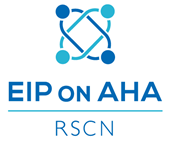Three questions to RSCN Head of Policy and Operations: John Farrell
What RSCN can do for RSs?
The RSCN was established as a Network for Reference Sites, providing opportunities for them to share and transfer evidence-based health and care policies, innovation, and digital technology solutions so that through the collective efforts of its Reference Site members we can inform, influence, and facilitate change in how health and care is delivered across Europe. All Members of the RSCN have access to the unique expertise and knowledge a pan European Network brings. This includes access to evidence-based best practice in health and care policies and strategies, healthcare pathways, innovation, and digital technology solutions. There are also opportunities for collaborating on projects and participating in Twinning schemes that support the transfer of knowledge and innovation from one region to another.
Membership categories?
There are 4 Membership categories: Ordinary; Strategic; Honorary; and Associate/Affiliate. The first 2 Membership categories are relevant to Reference Sites. A Reference Site can automatically activate its Ordinary level membership once they have been awarded Reference Site Status. By becoming an Ordinary level member a Reference Site can avail of the following benefits: membership of the General Assembly with opportunities for election to the Executive Board, participating in RSCN Twinning opportunities, partnership opportunities for RSCN led projects, membership of Thematic Groups to address shared challenges across Regions, access to information on evidence-based good practices, information on funding calls, RSCN webinars, Quarterly Newsletters, access to expert speakers for Reference Site events, and a range of management and advisory services.
Those regions that were awarded Reference Site status following the extended 3rd Call for Reference Sites will have already received a letter from the RSCN Secretariat inviting them to become a Member of the RSCN and to activate their free Ordinary level membership; or apply to become a Strategic Member. By becoming a Strategic Member a Reference Site will in addition to the benefits from Ordinary level be able to avail of the following additional benefits:
- Increasing their visibility across Europe
- Help in showcasing the Reference Site's evidence-based innovation through:
- RSCN webinars
- Speaking opportunities at RSCN events
- Promoting opportunities at other international Health and Care / Active and Healthy Ageing events
- Help in targeting and developing connections to key stakeholders in other Reference Sites within the RSCN network
- Reduced Registration Fees for RSCN organised events
- Reduced Management Services and Advisory Fees, for example Expert mentoring and tutoring support in the design and implementation of local strategies
- Financial Support for 1 representative from the Reference Site to attend an RSCN approved event (1 per year)
- Eligibility to be nominated to one of eight positions on the RSCN Executive Board reserved for Strategic Members; and therefore be able to inform the future strategy of the organisation
Strategic Membership is available for €5000 per year.
How RS can be involved?
There is a saying "what you put in, is what you get out". This applies to everything we do and in the context of EIP on AHA it can be in how we develop and grow the quadruple helix partnership within the Reference Site so that the health and care challenges faced by a region can be effectively addressed through the collaboration of all the stakeholders. It is about being proactive, demonstrating leadership, showing initiative, and being willing to participate. The same applies with being a member of the RSCN and what a Reference Site can do to get the maximum value from their membership. Some of this may come down to the motivation to become a Reference Site. The RSCN offers plenty of opportunities for Reference Sites to become involved and proactive within the Network, for example they can: express interest in joining one of the Thematic Groups the RSCN develops from time to time to address common challenges across Europe; participate or present in RSCN organised webinars, workshops, seminars, events; register their evidence-based solutions and good practices in the repository, which can help other Reference Sites to be aware of existing solutions to similar challenges; highlight areas of expertise within the Reference Site region which may help the RSCN in creating partnerships for project funding calls; apply to the Calls for Twinning Schemes, take part in surveys initiated by the RSCN, share with other Reference sites areas of expertise you need or can offer, give us your ideas on how we can improve the Network. If I was to look back in a number of years the type of organisation I would like to see was one where its members actively participated in the direction, policy, and work of the RSCN, where collectively we all made a difference not only within our own regions but across Europe with patients, service users, health providers, policy makers, SMEs benefiting from the collective energy and experience we can all bring to make sustainable change a reality in the delivery of health and care.
